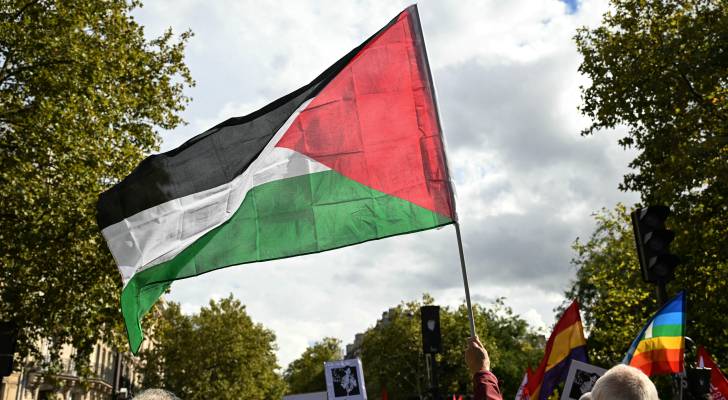Protester waves a Palestinian flag during a march asking for the “recognition of the State of Palestine and the end of the genocide” in Paris.
UN to convene today on high-level “Question of Palestine” summit
A high-level international conference on the Palestinian question will take center stage at the United Nations today, Monday, as a coalition of global powers seeks a new path to peace that circumvents the diplomatic deadlocks of the past.
The event, officially titled the High-level International Conference for the Peaceful Settlement of the Question of Palestine and the Implementation of the Two-State Solution, is a resumption of a diplomatic initiative first co-hosted by France and Saudi Arabia in July.
Read more: Canada, Australia, UK officially recognize State of Palestine
The discussions are guided by a recently adopted document, the New York Declaration on the Peaceful Settlement of the Palestinian Question and the Implementation of the Two-State Solution. Passed on September 12 with overwhelming support from 142 of 193 UN member states, the declaration calls for a "just and lasting peace" based on a two-state solution and an immediate ceasefire in Gaza.
The document also demands the unconditional release of all captives and explicitly calls for the disarmament of Hamas and its exclusion from the future governance of Gaza.
A key provision of the declaration is a phased, 15-month plan to establish a sovereign Palestinian state, with the deployment of a temporary international stabilization mission in Gaza to provide security and reconstruction support.
A Widening Diplomatic Divide
The strong show of support for the declaration highlights a growing schism in international diplomacy. The resolution was voted against by a small bloc of only 10 countries, including the United States and ‘Israel’.
‘Israel's’ Ministry of Foreign Affairs issued a press release "utterly rejecting" the UNGA's decision, labeling the assembly a "political circus detached from reality".
‘Israel's’ core objections are that the resolution does not explicitly name Hamas as a “terrorist organization” or hold it responsible for the continuation of the war by refusing to release captives and disarm.
The United States has also voiced strong opposition, with the US Mission to the UN stating that the Palestinian Authority has failed to adhere to the Oslo Accords, specifically citing "pay for slay" payments.
The U.S. has also criticized the Palestinian Authority's "lawfare campaigns" at the International Criminal Court and International Court of Justice, which it argues are designed to "bypass negotiations" and are counterproductive to achieving peace.
Read more: Netanyahu vows to fight calls for Palestinian recognition at UN
The US has publicly dismissed the recognition of a Palestinian state by its allies as a "performative gesture".
For decades, the ‘Israeli’-Palestinian conflict was largely managed under US diplomatic leadership.
However, the recent formal recognition of a Palestinian state by key US allies—including the UK, Canada, Australia, and Portugal—represents a significant departure from this historical alignment.
France, which co-hosted the July conference, has also announced its intention to formally recognize Palestine in conjunction with the UN General Assembly.
A Response to a Humanitarian Catastrophe
The urgency of the current diplomatic push is a direct response to the catastrophic humanitarian crisis in Gaza. The latest figures are sobering: more than 65,000 Palestinians have been killed since the aggression began in October 2023.
An estimated 90% of the population in Gaza has been displaced, with famine conditions emerging in Gaza City.
The Unspoken Role of the UN General Assembly
The choice to lead this effort through the General Assembly rather than the Security Council is for a reason.
The UN Security Council, the only body with the power to issue legally binding resolutions, has been repeatedly deadlocked on the ‘Israeli’-Palestinian conflict due to the consistent use of the veto by the United States. This has effectively rendered the Security Council powerless to act.
In contrast, while General Assembly resolutions are non-binding and function through "moral suasion," they can be used to build a powerful global consensus that is politically difficult for opposing nations to ignore.
A History of Broken Promises
The diplomatic efforts are part of a long and often frustrating history. The UN's involvement with the "Question of Palestine" began in 1947, when the UN General Assembly adopted Resolution 181, which first recommended the partition of Mandatory Palestine into an Arab and a Jewish state .
The issue of Palestinian refugees, a direct consequence of the 1948 war, was addressed in the 1949 passage of Resolution 194, which affirmed the right of return for refugees wishing to live in peace with their neighbors .
Over the past eight decades, the General Assembly has passed countless resolutions on the issue.
However, the lack of a binding enforcement mechanism and the persistent lack of political will from the primary parties have meant that these resolutions have largely remained aspirational rather than transformative.
The meeting today is, therefore, a test of whether the international community can finally make good on a promise made nearly eight decades ago.




